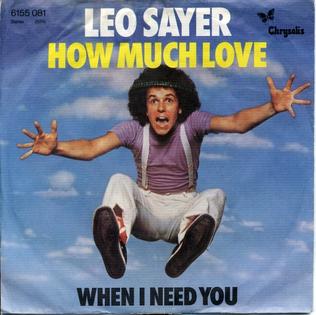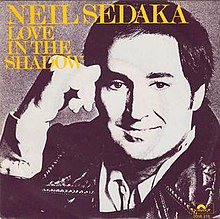
"Laughter in the Rain" is a song composed and recorded by Neil Sedaka, with lyrics by Phil Cody. It includes a 20-second saxophone solo by Jim Horn. The song hit No. 1 on the Billboard Hot 100 in February 1975.

"Solitaire" is a ballad written by Neil Sedaka and Phil Cody. Cody employs playing the card game of solitaire as a metaphor for a man "who lost his love through his indifference"—"while life goes on around him everywhere he's playing solitaire". The song is perhaps best known via its rendition by Carpenters. Another version by Andy Williams reached number 4 in the UK Singles Chart in 1973.

"Tell Me a Lie" is a song composed by Mickey Buckins and Barbara Wyrick. Originally recorded by Lynn Anderson for her 1974 What a Man My Man Is album, it was released later that same year as a single by Sami Jo Cole, who took it to number 21 on both of the major U.S. pop charts. It also charted in Canada (#17). Cole's version was also an Adult Contemporary hit, reaching number 14 in the U.S. and number 27 in Canada.
"Love Will Keep Us Together" is a song written by Neil Sedaka and Howard Greenfield. It was first recorded by Sedaka in 1973. The brother-sister duo Mac and Katie Kissoon also recorded a version in 1973. American pop duo Captain & Tennille covered it in 1975, with instrumental backing almost entirely by “Captain” Daryl Dragon, with the exception of drums played by Hal Blaine; their version became a worldwide hit.

"Bad Blood" is a popular song written by Neil Sedaka and Phil Cody. The song, with uncredited backing vocals by Elton John, reached number one on the Billboard Hot 100 in 1975, remaining at the top position for three weeks. It was certified Gold by the RIAA and was the most successful individual commercial release in Sedaka's career. "Bad Blood" was replaced at the number one spot by John's single "Island Girl".

"More Love" is a 1967 hit single recorded by the American soul group The Miracles for Motown Records' Tamla label. The single, included on the group's 1967 album Make It Happen, later reissued in 1970 as The Tears of a Clown. Kim Carnes's 1980 cover of the song reached the Top 10 of Billboard's Adult Contemporary and Hot 100 charts.

"Keep on Singing" is a 1973 song composed by Danny Janssen and Bobby Hart, and was originally recorded by Austin Roberts from the album Austin Roberts. It was released as a single on Chelsea Records and reached No. 50 on the U.S. Billboard Hot 100 and No. 39 on the Cash Box Top 100. In Canada it reached # 79. "Keep on Singing" was best known as a hit single by Helen Reddy in 1974.

"Lonely Night (Angel Face)" is a song written by Neil Sedaka. The song was first recorded by Sedaka and appeared as a track on his 1975 studio album, The Hungry Years. The following year the song was made popular when covered by the pop music duo Captain & Tennille, who took their version to number 3 on the Billboard Hot 100.

"Love Ballad" is a song by R&B/Funk band L.T.D. Jeffrey Osborne is the lead singer.
"The Immigrant" is a 1975 single written by Neil Sedaka and Phil Cody and performed by Sedaka. The single was the second release from his album, Sedaka's Back. "The Immigrant" was dedicated to John Lennon and the immigration problems that he faced. The single peaked at number 22 on the Billboard Hot 100 and spent one week at number one on the Easy Listening chart in May 1975.

"How Much Love" is a popular song from 1977 by the British singer Leo Sayer. It was the third of three single releases from Sayer's 1976 album, Endless Flight. The song was co-written by Sayer with Barry Mann.

"Jimmy Loves Mary-Anne" is a 1973 song written and composed by Elliot Lurie and recorded by Lurie's band, Looking Glass. It was the first track on their second and final album, Subway Serenade. The title has also been spelled "Jimmy Loves Mary-Ann".
"Workin' On a Groovy Thing" is a song written by Neil Sedaka and Roger Atkins which had its highest profile as a 1969 hit single by the 5th Dimension.

"I Like Dreamin'" is the debut single by Kenny Nolan, taken from his eponymous debut album. The recording was issued as the album's lead single in October 1976, spending 27 weeks on the U.S. Billboard Hot 100.

"Stand Tall" is the title of an international hit single by Burton Cummings, taken from his eponymous debut album. The song was released less than two years after "Dancin' Fool", the final hit single by the group for which Cummings had been lead singer, The Guess Who.

"Could You Ever Love Me Again" is a 1973 song recorded by Gary and Dave. It became their greatest hit, reaching #7 in Australia and #1 in Canada. It was also a minor hit in the United States.

"Rainy Jane" is a song written and originally recorded by Neil Sedaka in 1969, covered two years later by Davy Jones. Sedaka's rendition became a minor hit in the U.S., Canada and Australia.

"That's When the Music Takes Me" is a song written and originally recorded by Neil Sedaka in 1972. It is a track from his Solitaire LP, as it was billed in the UK, entitled as Neil Sedaka in the U.S.

"Don't Throw It All Away" is a song written by British musician Gary Benson and first released by the Shadows on their 1975 album Specs Appeal. Benson released his version as a single later the same year, which reached number 20 on the UK Singles Chart in the fall of 1975.

"Puppet Man" is a song written by Neil Sedaka and Howard Greenfield. It was originally recorded by Sedaka on his 1969 Workin' on a Groovy Thing LP. The first hit version was by The Fifth Dimension in 1970. The following year it was also a hit for Tom Jones.

















